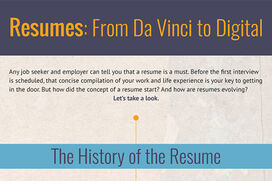
Resumes: A Guide to the Past, Present, and Future of Job Hunting
The resume has become such a standardized component of today’s job searching process that it's near impossible to attain a position without one. But this certainly wasn't always the case. The process of resume writing has undergone a number of transformations throughout its history, and it will likely shift again with the rapid rise of digital technologies.

A brief history of the resume
The first recorded resume was written by famed Italian artist and polymath Leonardo Da Vinci back in 1482, according to Business Insider. The document wasn't called a resume, however. It consisted of a list of Da Vinci's accomplishments as an inventor of war technologies and was addressed to the Duke of Milan. The first recorded example of the term “résumé” being employed came later in the year 1500, when a British Lord composed a letter to his business acquaintances. The letter outlined his professional accomplishments and he termed it a “résumé” because it “summed up” his work. For many hundreds of years after, the resume slowly became integrated into the job application process. Business Insider reported resumes didn't actually become a required part of the job hunting process until around the 1950s. Before that time, resumes were common, but they were regarded as procedural and more of an afterthought. Many were written down on scraps of paper during or after a meeting with a prospective employer. Business Insider noted that prior to the 1950s, resumes also placed a much greater emphasis on a candidate's social life. For example, a job hopeful was generally expected to include information pertaining to his or her religious beliefs, physical characteristics and marital status.
Resumes today and beyond
Today, computers and the internet have streamlined the job application process. The advent of job search websites and social networks has made it easier than ever to find and apply to a job, as well as establish and cultivate professional networks. The current resume typically follows a standardized format, with information pertaining to education, work history, and relevant skills. Notably absent are details regarding a candidate's personal life and physical characteristics, which have been phased out due to employment discrimination laws and changes in social custom. With the boom in innovative digital platforms set to increase, resumes will likely become more detailed and comprehensive in the future. Ziprecruiter predicts that resumes of the future will place a greater emphasis on links to social media pages, and will also potentially include video content and other interactive features.
 Back to Top
Back to Top
